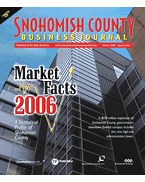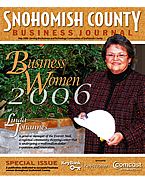 |
|
|
YOUR
COUNTY.
|
YOUR
BUSINESS JOURNAL.
|
Published February 2006
Disagreement
enriches
business if done right
 Discord
isn’t a big issue in music when you are talking about solos. It’s when
you start to put performers together that the possibilities expand, both
for discord and for harmony.
Discord
isn’t a big issue in music when you are talking about solos. It’s when
you start to put performers together that the possibilities expand, both
for discord and for harmony.
As music developed, medieval musicians found out a lot about discord. One particular form, the augmented fourth, sounded so bad to them that it was called the “devil in music” (diabolus in musica) and they were forbidden to use it. (For the record, an augmented fourth can still sound pretty bad, even to modern ears tempered by exposure to diabolical levels of head-banger music.)
Discord, at least a certain level of it, would eventually achieve a place in music.
Over time, musicians found that there were types of discord that established progression and prepared the listener for resolution. One of these, the dominant seventh, would go on to become the foundation of first the blues, then jazz and then rock.
Management, too, has come to terms with discord. Back in the heyday of General Motors, for example — that is, before it found its name linked to junk bonds — it was the most successful corporation in the world and people looked to it as a management model. Alfred P. Sloan Jr., GM’s chairman, had built a management structure and, as importantly, a management environment, that was considered the best in its time.
How did he feel about discord? There is a famous quote that describes his feelings at a meeting when he discovered that all his senior managers were in complete agreement on a strategic decision. He said, “I propose we postpone further discussion of this matter until our next meeting to give ourselves time to develop disagreement and perhaps gain some understanding of what the decision is all about.”
Sloan believed that in management, a certain type of disagreement enriched the experience. Disagreement, if kept within bounds, illuminated an issue and informed the decision-makers in management.
At GM, of course, Sloan headed up a management structure that was considerably more structured and less dissent-ridden than we find in today’s business world. Managers now are often faced with an inordinately high level of discord. The four D’s — discord, dissent, disagreement and dissatisfaction — sometimes seem to be an endemic part of today’s workplace that we can’t do anything about.
The truth is, though, that we can do something about it. In fact, we can do a lot to change it into something a lot more productive.
Here are some things that have worked for me and for others:
First, of course, lead by example. Don’t whine and complain about decisions that people higher up the food chain have made. If, before it is made, you are asked by the decision-maker, give your honest and considered opinion, but then let it go. You want to develop a reputation for supporting decisions once they are made, not for second-guessing them.
Second, make sure that everyone on your team knows the difference between helpful disagreement and disruptive discord. You get to define that difference, but you have to communicate your definitions and boundaries for behavior. Set rules for how open discussions will be conducted, and make sure that everyone understands the value of those rules.
Third, if you have some significant disagreement regarding a proposed decision and you, along with the majority, choose to move ahead anyway, get those who opposed the decision to help you instead of sulking. Select the person who expressed the most intense disagreement and get him or her to act as the “decision evaluation analyst” — reporting to the team in, say, 30, 60 and 90 days whether the decision in retrospect looks good, questionable or bad. Even the most disagreeable person in today’s workplace will usually jump at the chance to prove that he or she “was right all along.” And it can be a terrific learning experience for them as they acquire a new understanding of what decision-making is all about.
Fourth and most importantly, help your team members to understand the difference between disagreement and enmity. At your meetings you should set, and demand, a tone where the decision is discussed on its merits, but not personalized.
Refuse to accept hurtful arguments directed against or disparaging an individual, or any statements that begin with “you (or he, she) always ….”
These statements are the “devil’s music” of business discussions and should be dismissed and discouraged. The more personal the discussion is, the harder it is to leave it behind. Team members can learn to disagree without dislike — if you show them how.
Disagreement enriches business decisions in the same way that discord leads music to be in perfect harmony. And it is the manager’s job to teach the team players how to sing.
James McCusker, a Bothell economist, educator and small-business consultant, writes “Your Business” in The Herald each Sunday. He can be reached by sending e-mail to otisrep@aol.com.













